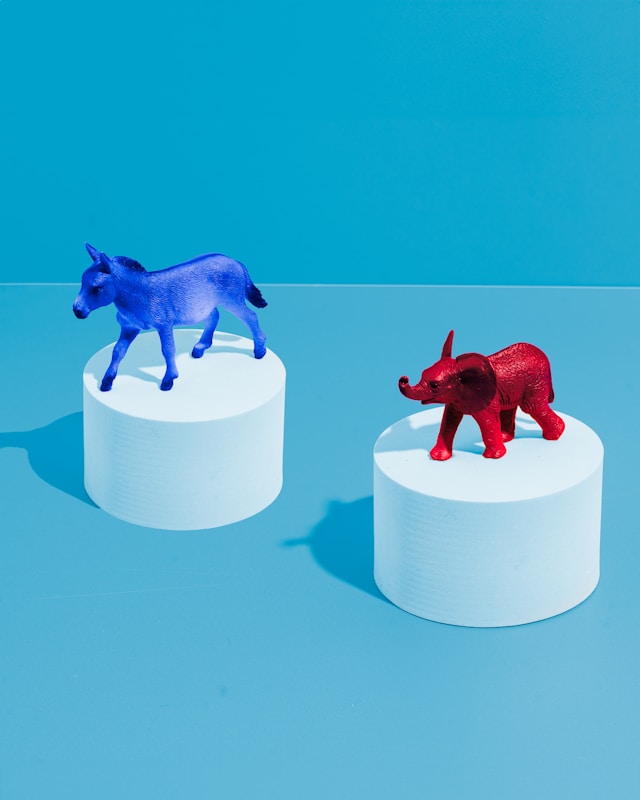As the U.S. election approaches, the insults are getting more heated and the accusations more shocking. And for those paying attention, the political polarization is stretching our emotional and democratic seams to the point of shredding. But are Americans really as divided as social and news media tell us we are? Or is the content designed to keep us huddled in our ideological bubbles and hating “the other”? Studies show that most Americans, regardless of political ideology, agree on much more and share more values than we think, but we believe everyone else is wrong, convinced by the tiny minority that is the loudest, most outraged and most convincing.
“A record-high 80% of U.S. adults believe Americans are greatly divided on the most important values, while 18% believe the country is united,” Gallup reported on Sept. 23. “The percentage seeing the nation as divided has ticked up from 77% the last time Gallup asked the question in 2016. It is more than 10 percentage points higher than in prior 2004 and 2012 measures.”
It’s depressing to learn that we feel that way about each other, that we don’t understand how other people think and vote the way they do. But there’s hope, as studies tell a different story.
Reality Shows Something Different From Perception
Axios posed a thought experiment in April: “What if we’ve been deceived into thinking we’re more divided, more dysfunctional, and more defeated than we actually are?” It acknowledged that deep divisions exist but debunked many culture war assumptions that dupe us into making the other side the enemy. It reported statistics around topics like Christian nationalists, abortion, college professors, support for Israel and immigrants. It went on to cite that most Americans, Republicans and Democrats, agree on the right to vote, freedom of speech, press and religion, and the right to privacy.
Timerecently reported on this same issue. A professor named Todd Rose conducted a study on how people ranked specific topics and how they thought other people would rank the same topics.
“When the results were tallied, the surprise was not that ‘People have individual rights’ came in first, or that ‘People have high-quality health care’ finished second. The surprise was the third highest priority: ‘Successfully address climate change.’ We know that’s a surprise because, on the list of what ‘other people’ considered important, climate came in 33rd. In other words, no one thought their fellow Americans saw climate as the high-priority item nearly everyone actually considered it to be.”
Much of what news reports, politicians, and pollsters call polarization, Rose understands as “learned divisiveness” — division propagated by the assumption that it exists even where it does not.”
Another 2021 study in the Journal of Politics found that when respondents identified someone they thought had a negative view, it was typically talking heads on a cable news show, not another regular person.
Market researcher Diane Hessan’s work added to these findings. Her 2021 book, Our Common Ground: Insights from Four Years of Listening to American Voters, related the findings from 500 voters over a four-year study. She found that “An overwhelming majority of voters believe in commonsense gun licensing and regulation. They are pro-immigration. They believe climate change is real and the coronavirus is deadly. They care deeply about their families and are willing to work hard to make ends meet. And, they believe that Washington is slow, bureaucratic, and not working in their best interests.”
Path To Unity
With all these studies and insights there must be a way out of this negative spiral. It turns out the solution is up to us. We all need to consider the source of our information, listen more, drop the assumptions and remember we share many of the same values and have a lot in common.
Here are a few suggestions from the experts.
- Axios posed this idea: “In a given year, you meet scores or more people you spend enough time with to appraise their character. Think about them: How many do you think are decent, normal people who do volunteer work, help shovel after a storm, look out for family and neighbors?”
- Diane Hessan suggested: “The path to healing our divided nation is both simple and profound. We must turn down the heat. We must begin to listen, to stop presuming, to try to understand, to treat each other with dignity, and to know that most Americans are not crazy radicals. We truly share common ground. If we can pull together, we can have a much better America.”
- “Fortunately, when people learn the truth about the other side, they feel better,” the Time article stated. “In so many studies, people register surprise that their assumptions about their rivals are wrong. “They’re like, ‘Oh, I didn’t know that,’ and then they feel better about the other side.”

